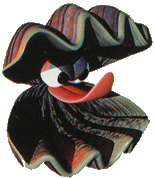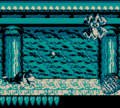Giant Clam
- This article is about a boss in Donkey Kong Land. For a type of item container from Donkey Kong Country: Tropical Freeze, see Item container § Donkey Kong Country: Tropical Freeze. For a recurring enemy also called "Giant Clam" in the New Super Mario Bros. U PRIMA Official Game Guide, see Clampy.
| Giant Clam | |
|---|---|
 Artwork of the Giant Clam, reused from art of regular Clambos from Donkey Kong Country | |
| Species | Clambo |
| First appearance | Donkey Kong Land (1995) |
The Giant Clam,[1] or Clambo,[2][3][4] is the second boss of Donkey Kong Land. It is fought in Seabed Showdown, the boss level of Kremlantis. Here, the Giant Clam's main attack is spitting pearls at Donkey Kong or Diddy Kong, similarly to Clambos from Donkey Kong Country but unlike the ones in Donkey Kong Land. Unlike most Clambos, which are sessile, the Giant Clam is capable of moving through the water. The Giant Clam always shoots out pearls from the opposite corner that the Kongs are in. In order to harm the Giant Clam, Donkey Kong or Diddy Kong must trick it into shoot a pearl at a nearby diagonal, harmless sponge in a corner and then quickly move out of the way before the pearl hits them. In doing so, the pearl bounces off the sponge's shell and into the Giant Clam. Each time the Giant Clam is hit, it moves around faster and shoots pearls at a quicker pace. Once the Giant Clam takes a total of eight hits, it is defeated. Like the other bosses, defeating the Giant Clam causes three Banana Bunches to fall from the top of the screen.
Gallery[edit]
Names in other languages[edit]
| Language | Name | Meaning | Notes |
|---|---|---|---|
| Japanese | ボス・クランボー[5] Bosu Kuranbō |
Boss Clambo |
References[edit]
- ^ July 1995. Nintendo Power Volume 74. Nintendo of America (American English). Page 20.
- ^ Donkey Kong Land, Nintendo Magazine System (UK) WORLD EXCLUSIVE Review booklet. Page 15.
- ^ August 1995. Nintendo Magazine System (UK) Issue #35. Page 51.
- ^ October 1995. Nintendo Magazine System (AU) Issue #31. Page 65.
- ^ Super Donkey Kong GB Kōryaku Guide Book. Page 9
